Pelindaba
Coordinates: 25°48′2″S 27°56′2″E / 25.80056°S 27.93389°E

Pelindaba is South Africa's main Nuclear Research Centre, run by The South African Nuclear Energy Corporation, and was the location where South Africa's atomic bombs of the 1970s were developed, constructed and subsequently stored. It is situated near the Hartbeespoort Dam, approximately 33 km (22 miles) west of Pretoria on the farm which belonged to Gustav Preller.
History
The research reactor SAFARI-1 has operated since 1965, with an output of up to 20 MW. A 4 MV Van de Graaff particle accelerator operates for various purposes in nuclear sciences.
The South African Nuclear Energy Corporation (NECSA) was established as a public company by the Republic of South Africa in 1999.
Accidents
1996 accident
An accident at the Pelindaba research facility in the exposure of workers to radiation. Harold Daniels and several others died from cancers and radiation burns related to the exposure.[1]
2009 leak
16 March 2009, a leak of radioactive gases from Pelindaba was reported by NECSA. Abnormal levels of gamma radiation associated with xenon and krypton gases were detected, causing an evacuation of staff and an emergency to be declared.[2][3]
Armed attack on the facility
Shortly after midnight on 8 November 2007, four armed men entered the facility and headed towards a control room in the eastern block.[4] According to the South African Nuclear Energy Corporation (NECSA), the state-owned entity that runs the facility, the four "technically sophisticated criminals" deactivated several layers of security, including a 10,000-volt electrical fence, suggesting insider knowledge of the system. An off-duty emergency services officer, who was shot by the men after a brief struggle, triggered the alarm, alerting a nearby police station. The four attackers escaped the facility by the same way they had entered after 45 minutes alone in the compound. Though their images were captured on closed-circuit television, they were not detected by security officers because nobody was monitoring the cameras at the time. On 16 November, three suspects, between the ages of 17 and 28, were arrested by local police in connection with the incident but were later released. In response to the attack, NECSA suspended six Pelindaba security personnel, including the general manager of security and promised an "internal investigation which will cover culpability, negligence and improvements of Security Systems." [5]
See also
- Treaty of Pelindaba - African Nuclear Weapons Free Zone Treaty
- South Africa and weapons of mass destruction
References
- ↑ http://www.pmg.org.za/mp3/2007/070620pcenviro1.mp3
- ↑ http://www.digitaljournal.com/article/269315
- ↑ http://www.urbansprout.co.za/all_those_for_nuclear_remain_in_the_room
- ↑ http://www.pretorianews.co.za/?fSectionId=&fArticleId=vn20071109061218448C528585
- ↑ Washington Post, 20 December 2007, Op-Ed by Micah Zenko.
| |||||||||||||||||||
